When Is Hand-Rearing Parrot Chicks Recommended?
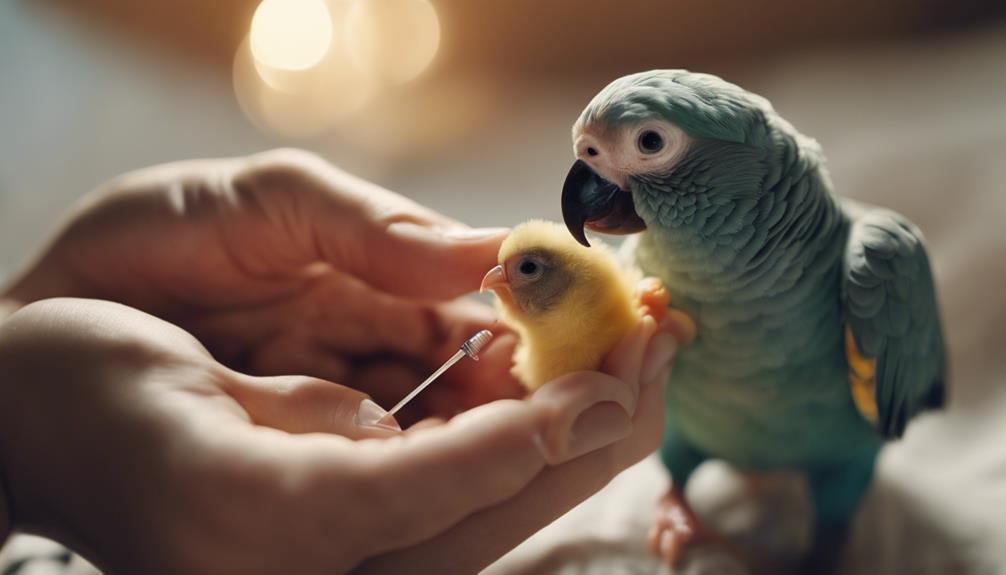
Hand-rearing parrot chicks is recommended when parental care is lacking or when there are health issues that require specialized attention.
It requires expertise and dedication to ensure the well-being of the chicks.
Health Concerns for Parent Parrots
Health concerns for parent parrots may necessitate hand-rearing of their chicks to ensure optimal health and well-being. Nutrition concerns play a critical role in the successful rearing of parrot chicks. Parent parrots may not always provide the necessary nutrients needed for the chicks' growth and development. By hand-rearing the chicks, caregivers can closely monitor and control the chicks' diet to ensure they receive the appropriate balance of proteins, vitamins, and minerals essential for their health.
Breeding behaviors of parent parrots can also impact the decision to hand-rear chicks. Some parent parrots may exhibit aggressive or neglectful behaviors towards their offspring, putting the chicks at risk. Hand-rearing allows for a safer environment where the chicks can thrive without being exposed to potential harm.
Environmental factors and developmental stages further emphasize the importance of hand-rearing parrot chicks. By controlling the chicks' surroundings and providing appropriate care tailored to their specific developmental needs, caregivers can promote healthy growth and reduce the risk of health complications.
Abandonment by Parent Parrots
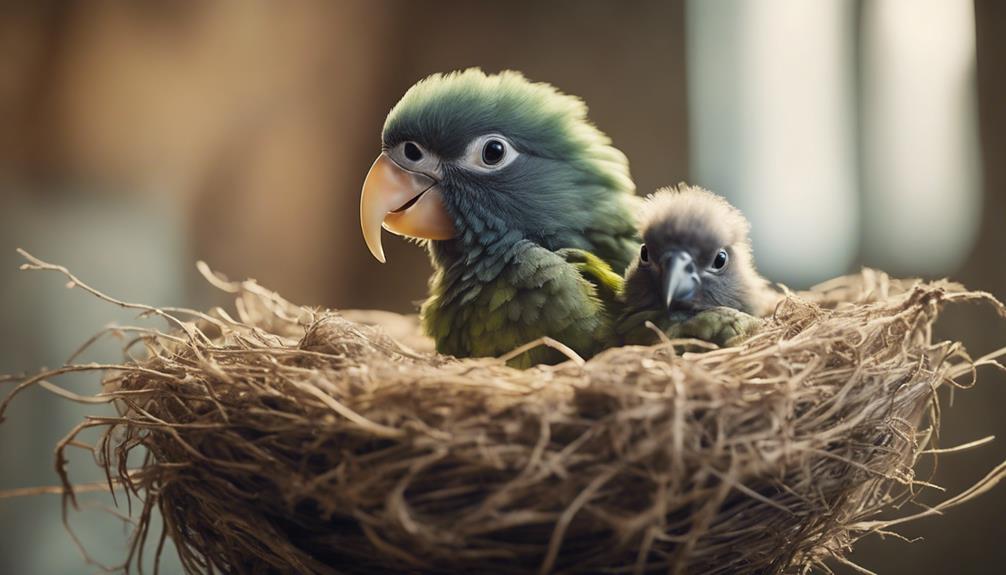
Parent parrots may abandon their chicks due to various factors such as stress, illness, or inadequate nesting conditions. When this abandonment occurs, hand-rearing the chicks becomes necessary to ensure their survival. Behavioral challenges in parent parrots, such as aggression towards their young or a lack of parental instincts, can lead to abandonment. In such cases, hand-rearing the chicks allows for proper care and development.
Reasons for Abandonment by Parent Parrots:
| Factors | Description |
|---|---|
| Stress | Parent parrots under stress may neglect or abandon chicks. |
| Illness | Sick parent parrots may not be able to care for their young. |
| Inadequate Nesting | Unsuitable nesting conditions can lead to chick abandonment. |
| Behavioral Challenges | Aggression or lack of parental instincts can cause abandonment. |
Hand rearing involves not only feeding the chicks but also bonding with them to ensure their social development. Through hand feeding, caregivers can establish strong bonds with the chicks, mimicking the care a parent parrot would provide. This process is crucial for the chicks' well-being and future interactions with humans.
Insufficient Parental Care
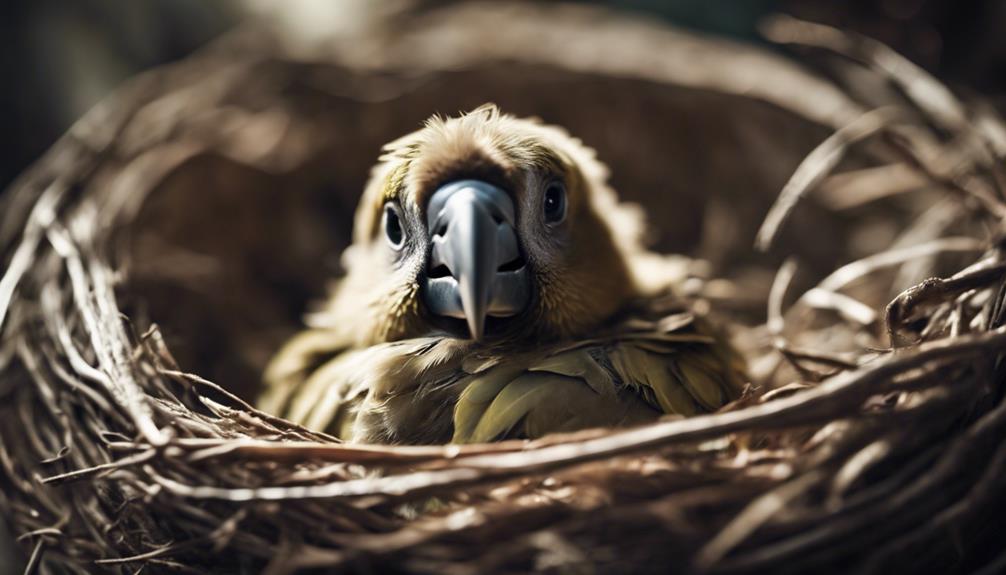
Insufficient care from parent parrots can result in developmental setbacks for their chicks. When parent parrots fail to provide adequate attention to their offspring, especially in terms of feeding and nurturing, it can lead to stunted growth and health issues. Feeding schedules are crucial for the proper development of parrot chicks. Parents must feed their chicks at regular intervals with the right nutrients to ensure optimal growth. In cases where parent parrots neglect these responsibilities, hand-rearing techniques become necessary.
Hand-rearing techniques involve feeding the chicks a specialized formula through syringes or feeding tubes. This method requires meticulous attention to detail, as over or underfeeding can have detrimental effects on the chicks' health. Additionally, hand-rearing allows caretakers to closely monitor the chicks' progress and ensure they receive the necessary care and nutrition. When parent parrots exhibit insufficient care, hand-rearing becomes a vital intervention to mitigate the developmental setbacks that may arise. By implementing proper feeding schedules and hand-rearing techniques, the chicks have a better chance of thriving despite the initial lack of parental care.
Medical Issues in Parrot Chicks
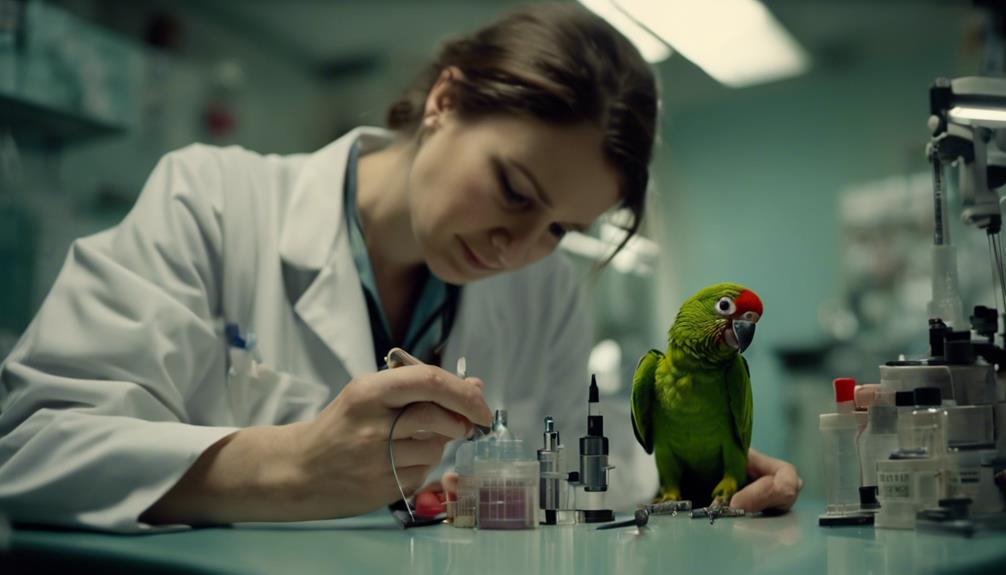
Parrot chicks can face common health problems such as nutritional deficiencies and respiratory infections.
Treatment options, including medication and dietary changes, are available to address these issues.
Preventive care measures like regular veterinary check-ups and maintaining a clean environment can help ensure the well-being of parrot chicks.
Common Health Problems
When hand-rearing parrot chicks, it is crucial to be vigilant for common health problems that may arise during the early stages of development. Nutritional deficiencies and respiratory infections are among the key issues to watch out for. Nutritional deficiencies can lead to stunted growth and weakened immune systems, making the chicks more susceptible to illnesses like respiratory infections. Feather plucking, a behavior where chicks pull out their feathers, can indicate stress, boredom, or health problems. Additionally, growth abnormalities such as skeletal deformities or delayed development can occur if the chicks are not receiving adequate care. Regular health check-ups and a balanced diet are essential to prevent and address these common health issues.
| Common Health Problems | Description |
|---|---|
| Nutritional deficiencies | Can lead to stunted growth and weakened immunity. |
| Respiratory infections | Often caused by nutritional imbalances. |
| Feather plucking | Indicates stress, boredom, or underlying issues. |
| Growth abnormalities | May result in skeletal deformities or delays. |
Treatment Options Available
Treatment options available for medical issues in parrot chicks typically involve a combination of dietary adjustments, medication administration, and close monitoring by a qualified avian veterinarian. When addressing the nutritional needs of a parrot chick experiencing medical issues, specific hand-feeding techniques may be necessary to ensure adequate nutrient intake. Additionally, monitoring growth milestones is crucial during the weaning process to identify any developmental concerns early on.
The weaning process itself requires careful attention to detail and may involve specialized diets tailored to the chick's condition. Medication administration should be carried out precisely as prescribed by the veterinarian to ensure the chick's well-being and recovery.
- Implementing tailored hand-feeding techniques.
- Monitoring growth milestones closely.
- Ensuring a smooth weaning process.
- Administering medications as prescribed.
Preventive Care Measures
Implementing a structured vaccination schedule is essential for safeguarding the health of parrot chicks and preventing potential medical issues. Alongside vaccinations, proper feeding techniques and temperature regulation are crucial for the well-being of parrot chicks.
Feeding chicks a balanced diet rich in essential nutrients promotes healthy growth and development. Socialization methods are also important for the chicks' mental and emotional health. Monitoring the chicks' growth regularly helps ensure they're developing at a healthy rate.
Additionally, maintaining optimal temperature levels in their environment is vital to prevent illnesses related to cold or heat stress. By following these preventive care measures diligently, caretakers can help parrot chicks thrive and minimize the risk of medical complications.
Behavioral Problems in Parent Parrots
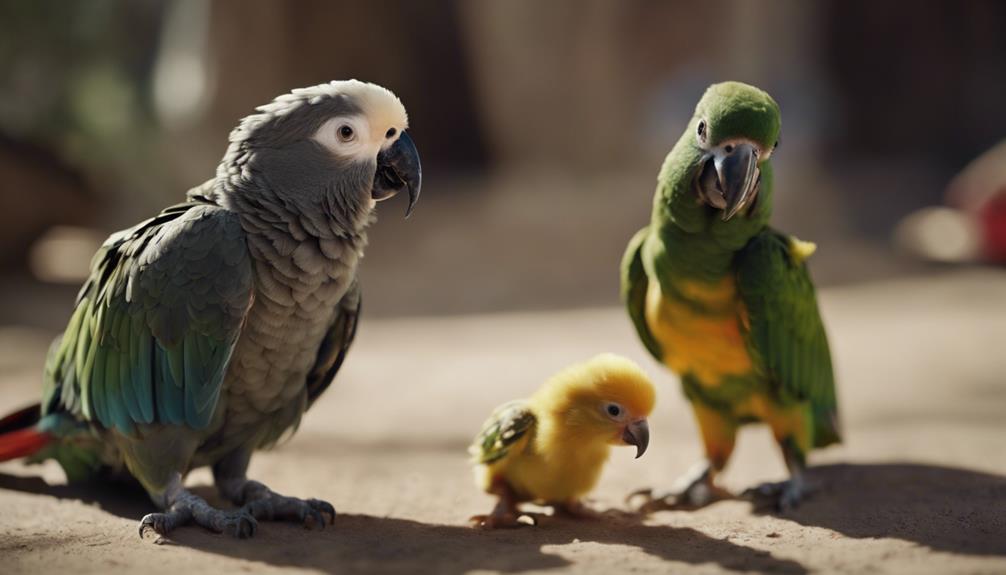
Parental bonding is crucial for the well-being of parrot chicks. Behavioral problems in parent parrots might disrupt this essential process. Aggressive nest defense is a common issue observed in parent parrots, which can lead to stress and even harm to the chicks.
Understanding these behavioral problems is vital for determining when hand-rearing parrot chicks might be necessary.
Parental Bonding Importance
Importance of establishing a strong parental bond with parrot chicks is crucial in preventing behavioral problems in adult parrots. When considering bonding benefits and early intervention, the following points are essential:
- Social Development: Proper parental bonding aids in the development of social behaviors in parrots.
- Stress Management: A strong bond with parents helps chicks manage stress more effectively.
- Communication Skills: Chicks learn important communication skills through bonding with their parents.
- Behavioral Stability: Early bonding contributes to the long-term behavioral stability of parrots.
Aggressive Nest Defense
Establishing a strong parental bond with parrot chicks is fundamental in preventing behavioral problems in adult parrots; one common issue that can arise is aggressive nest defense exhibited by parent parrots.
Aggressive nest defense is often triggered by disturbances near the nest area, leading to defensive behaviors such as biting, lunging, or vocal threats.
To address this issue, ensuring proper nest hygiene can help reduce stressors that may provoke aggressive responses. Additionally, maintaining consistent feeding schedules can promote a sense of security for parent parrots, potentially decreasing their need to defend the nest aggressively.
Inexperienced or Aggressive Parent Parrots
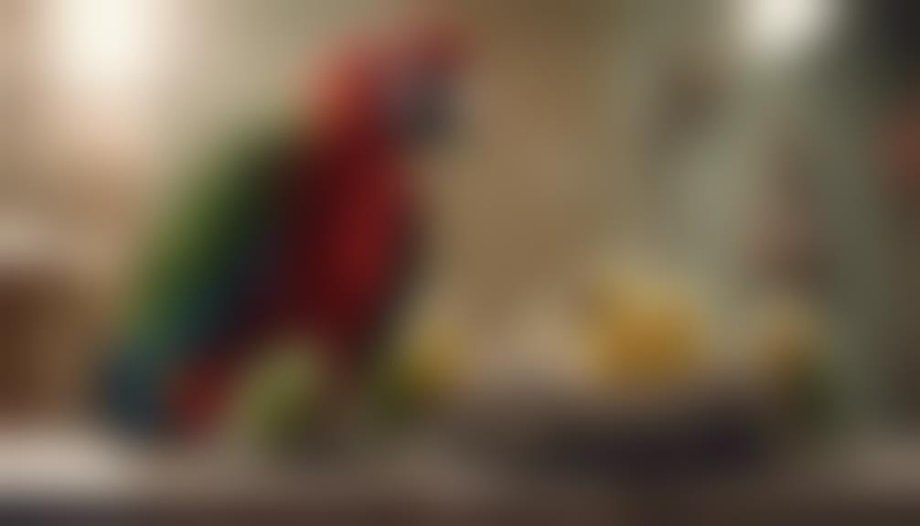
In cases of inexperienced or aggressive parent parrots, hand-rearing the chicks may be necessary for their well-being and development. When parent parrots lack the necessary skills to care for their offspring or exhibit aggressive behaviors that could endanger the chicks, intervention through hand-rearing becomes crucial. Inexperienced or aggressive behavior in parent parrots can lead to neglect, injury, or even death of the chicks, making it imperative to consider alternative care methods.
- Behavioral Training: Implementing behavioral training techniques can help address issues of inexperience or aggression in parent parrots.
- Bonding Techniques: Using bonding techniques can establish a strong bond between the chicks and their caregivers, fostering a sense of security and trust.
- Handling Aggression: Strategies for handling aggression in parent parrots are essential to ensure the safety of the chicks and the handlers.
- Socialization Strategies: Socialization strategies play a key role in the development of young parrots, promoting healthy interactions and behaviors.
Conservation and Breeding Programs
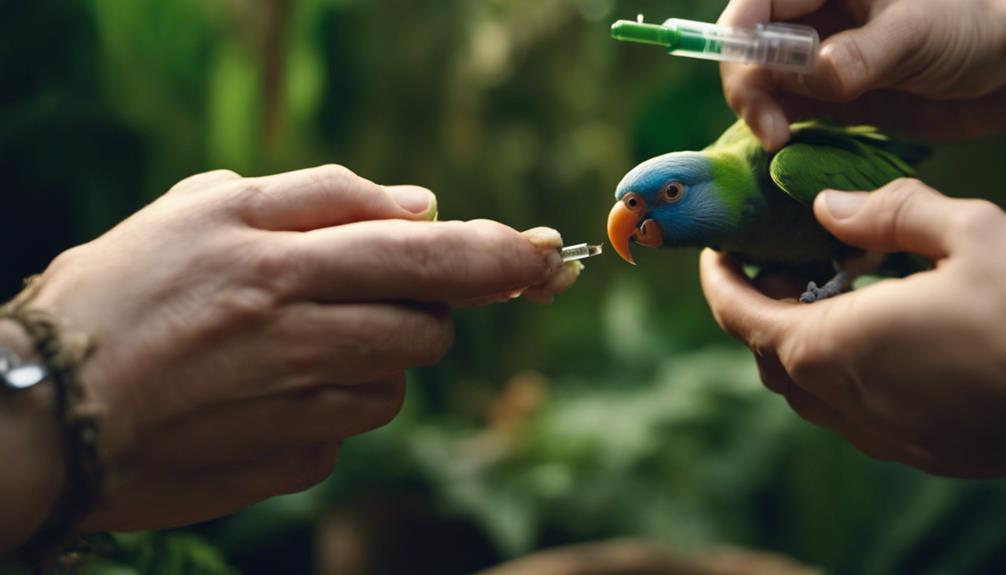
Conservation and breeding programs play a vital role in maintaining genetic diversity and population sustainability among parrot species. Through strategic breeding techniques, such as selective pairing based on genetic markers and behavioral observations, these programs aim to ensure the long-term viability of parrot populations. Research findings have highlighted the importance of genetic variation in combating disease susceptibility and adapting to changing environmental conditions. By carefully managing breeding programs, conservationists can help prevent the negative effects of inbreeding, such as reduced fertility and increased risk of genetic disorders.
Additionally, conservation and breeding programs provide valuable insights into the reproductive biology and behavior of parrots, aiding in the development of effective captive breeding protocols. These programs also contribute to conservation efforts by reintroducing captive-bred individuals into the wild to bolster wild populations. By integrating research findings into their breeding strategies, conservation programs can enhance the overall genetic health and resilience of parrot species, ultimately contributing to their long-term survival.
Frequently Asked Questions
How Can Hand-Rearing Parrot Chicks Affect Their Ability to Bond With Humans in the Future?
Hand-rearing parrot chicks can impact their future bond with humans. Bonding challenges and social integration difficulties may arise. It is essential to consider the long-term effects of hand-rearing on the chick's ability to form relationships.
What Are the Potential Long-Term Impacts on a Parrot Chick's Physical Health From Being Hand-Reared?
Hand-rearing parrot chicks can impact their growth development and nutrition needs, potentially leading to health concerns. Socialization process may be affected, influencing long-term physical health. Proper care and monitoring are essential for optimal outcomes.
Are There Specific Techniques or Methods Recommended for Hand-Rearing Parrot Chicks to Ensure Their Emotional Well-Being?
When hand-rearing parrot chicks, it's crucial to prioritize socialization techniques for healthy emotional development. Meeting their nutritional needs and implementing behavioral training are also essential. Proper care and attention are key to their well-being.
How Common Is It for Hand-Reared Parrot Chicks to Exhibit Behavioral Issues Compared to Those Raised by Their Parents?
Behavioral issues in hand-reared parrot chicks are more common than those raised by parents due to lack of natural socialization. Genetic predisposition may exacerbate problems. Behavioral training and environmental enrichment can mitigate some issues.
What Are Some Potential Challenges or Difficulties That May Arise When Transitioning a Hand-Reared Parrot Chick to Living With Other Parrots in a Social Setting?
Socialization challenges emerge when transitioning hand-reared parrot chicks to group living. Group dynamics influence behavioral adjustments needed for social integration. Understanding these complexities is crucial for successful incorporation of hand-reared parrot chicks into a social setting with other parrots.










